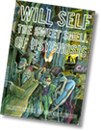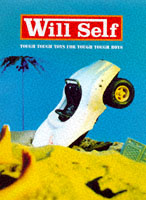Robert Clarke hears why Will Self has become an uncertain satirist
No other author in recent years has divided the critics with such relish as Will Self. With, three novellas and two novels to his credit, and now a third collection of short stories, Tough Tough Toys For Tough Tough Boys, he has established himself as one of this country’s most inventive and original prose writers.
However, far from accepting suggestions that after being portrayed as the enfant terrible of fictional satire, he now seeks the reward of critical respectability, Self remains as defiant as ever. ‘My work is intentionally divisive. In a way I have failed if I even get to that point. For a satirist to think in those terms would be absolutely ridiculous.’ Certainly, while Self is the main contender to the likes of Martin Amis, Julian Barnes and Graham Swift, he refuses to think of his writing as aimed at any notion of inclusion , however redundant, within critical tradition of the English literary canon. ‘The role of critics in terms of re-interpreting the novel for subsequent generations, as a blue print, as an analogue of the culture itself is a legitimate view. Yet at the same time writers, like any other artist can fall victim to all forms of vanity in consideration of their own gifts, and one of the chief sources of vanity interestingly is any notion of posterity.’
Clearly Self is walking a tight-rope between his role as writer and literary mediator, between reporter and involved spectator. However, what sets him apart from his contemporaries is the unique perspective his work offers of the pre-millennial era, the (post)modern fin de siecle. His is a fictional world of serial killers, pederasts, and petty bourgeois angst, a mixture of high art and low life which reflects the mundanity and artifice of the contemporary zeitgeist. ‘If you can get a contemporary cultural reference into the book, get away with quoting Richard and Judy and you are confident it is going to stand, then you have done your job, you have translated the contemporary into the timeless.’
It is Self’s willingness to acknowledge his literary inheritance, along with his reference to popular culture as a source of inspiration and ‘immutable intertextuality’, that distances him from the more incestuous and anachronistic impulses of contemporary fiction. Inspired by the likes of Celine, Nietzsche and Dostevesky, he shares with them a rage and revulsion, at what Sartre called society’s ‘self enclosed humanism’ and admits that ‘I was fascinated by the nihilists and consciously styled myself in that way as a destructive intellectual force, in so far as I saw my writing as an extension of that role.’ Like all great authors , Self writes with an overriding sense of his own omnipotence within the realm of his own imagination. Egotistical, maybe, but vain? No. If, as Self admits that ‘as you publish more, the more peculiarly arrogant you become,’ he is also modestly aware of his own limitations.
One of the major criticisms of his work is the way in which he is concerned more with the use of elaborate imagery and excessive metaphor, at the expense of characterisation and plot. Yet it is something that Self is willing to admit to. ‘I think the real problem with my books is the lack of structure. I have great difficulty with plot and I have never got on with character, and have always found them very artificial, and essentially romantic in that way, but I have largely written about ideas, and I view descriptive prose, the metaphorical aspects of the work as part and parcel of the ideas.’
 Although some of the stories in the new book, such as ‘The Rock of Crack as Big as the Ritz’, ‘Dave Too’ and ‘A Story for Europe’ have been published previously in The Sweet Smell Of Psychosis, his style of composition remains consistent – writing very quickly and spontaneously – a technique he developed from his journalism. ‘I don’t think of myself much, or what I am saying, and I am often very surprised by the result.’ It is this immediacy and unpredictability that has become a hallmark of his work. ‘My aim is to write con brio . I have always thought that you can only write one version of a book, and I think that is what hamstrings a lot of people’s approach to the notion of writing as a search for meaning, a pursuit of perfection. But I really suffer with a sense of dissatisfaction with my work. I am not sure if it would help if they were crafted better, I would be a different writer. I am content to remain ragged in that way.’
Although some of the stories in the new book, such as ‘The Rock of Crack as Big as the Ritz’, ‘Dave Too’ and ‘A Story for Europe’ have been published previously in The Sweet Smell Of Psychosis, his style of composition remains consistent – writing very quickly and spontaneously – a technique he developed from his journalism. ‘I don’t think of myself much, or what I am saying, and I am often very surprised by the result.’ It is this immediacy and unpredictability that has become a hallmark of his work. ‘My aim is to write con brio . I have always thought that you can only write one version of a book, and I think that is what hamstrings a lot of people’s approach to the notion of writing as a search for meaning, a pursuit of perfection. But I really suffer with a sense of dissatisfaction with my work. I am not sure if it would help if they were crafted better, I would be a different writer. I am content to remain ragged in that way.’
If critics have pointed to his apparent irreverence and lack of emotional engagement towards the act of writing, he is keen to suggest that ‘ I am fairly mystical about the relationship with the text . . . a posture of humility in relation to your own muse is quite important and my personal feelings I try to keep away from that.’ Unlike what he agrees has become the life blood of contemporary literary discourse: ‘Self-confession as I see it a really decadent syndrome, . . . a crisis of imagination and very depressing.’ While his work is ‘nakedly personal’, he opposes any literalist interpretation of his work, and is intent in distancing himself from the idea that fiction should pandering to the essentially regressive or escapist tendencies of the book reading public. ‘ To think that would be insane, I might as well write Mills and Boon. Every text contains within itself the idea of an objective reading . . those who think there is a subjective reader are full of shit. Just as I am trying to break down my resistance to writing books, so I suppose at the same time, I am trying to break down peoples resistance to reading them. Book’s aren’t life, they are just books.’

Somewhat ironically however, Self is a believer in the text as a non-factual body of words which stems from his early attempts at writing. ‘I had a great deal of difficulty with the feeling that I didn’t have anything to say, that everything had been written already and which really bedevilled me.’ As a result Self has go on to essentially redefine his role as an author. ‘I think of writing as a sculptural medium. You are not building things. You are removing things, chipping away at language to reveal a living form, ‘I think I am merely the midwife in that sense.’
True when you consider that he has delivered some of the most provocative fiction of the last ten years. Self’s stories are ‘ a fundamental assault’ not just on the over indulgent and emotional realism of contemporary fiction, but on ‘the antinomies of organised social living.’ ‘People always say that they are full of sex, and drugs and violence. . . I am not writing Jane Austen, but they are only full of those things in so far as it is necessary for them to mirror what I am trying to describe.’ Believing that a writer should have the courage of his own perversions, Self sees his work as ‘perverse only in the sense of the willingness to look upon the things that other people regard as serious. I regard myself as quite a puritan. I am quite a prudish person.’
The scene however in the concluding story of the new collection, ‘The Nonce Prize’ of a murdered child , the victim of a pederasts, whose dismembered body, dressed only in a Toy Story T-shirt, is bound to attract criticism. Yet for Self, ‘An image like that has a total necessity, the mixing of the mundane with the extremely horrible. Of course it is deliberately shocking’, but what he plays on is our sense of simultaneous aversion and innate attraction to the dark of human nature; the necessity to explore the depths of human potentiality. In a period in which politicians, priests and the press are agonising about how to find a basis for morality, Self’s ideas, lubricious as they seem, are in fact profoundly principled. For the author they represent ‘a chronic jouissance’ which reflects how people are increasingly finding consummate enjoyment within signs of guilt, despair, violence and death. ‘I am alluding to possibilities that we know are actualities. Just as sex and drugs continue to have their own pornography, the focusing of sexual relief into ritualised posture, the need to engage in a constructive relationship with power or with society, with having children or the meaning of generations. All these things seem to be subjected to their own pornography. I hate that about modern society, it is revolting.’
It is motifs such as these that provide the basis to many of the new stories; most readily in the grotesquely implausible ‘Flytopia’ and ‘Caring Sharing.’ Similarly, in the wonderfully conceived ‘Design Faults in the Volvo 760 Turbo: A Manual’, he welcomes us the ‘terrifyingly tiny world of the urban adulterer’ as throughout his work, Self continues to explore the exigencies that modern mass urban living places on the human psyche and the human body. The city in general, and London in particular, represents a new surface, a new hallucinatory experience, a sublime reincarnation of the horror and wonder at the rapidly shifting nature of the identities and anxieties of his characters and the inconstant historical realities they represent. ‘The idea of the modern urban scape is destructive at a very fundamental level the notion of scale. People’s idea of the city that they are living in is so grossly different from the physical reality that you are actually witnessing. There is a marvellous disparity between what is perceived and what it actually is.’

One of the strength of Self’s work is it’s ‘internally referential’ nature, and in Tough Tough Toys … the same characters often appear in corresponding stories. In doing so Self reinforces the common theme in the collection, ‘what it is to be an adult, about concepts and absences of maturity.’ It is a theme which is echoed in his style, as he plays with different modes, with elements of pastiche and with character for example, while at the same time being meta-critical, commenting on that tendency in his work.
Often surreal, frequently absurd, and always written with a recognisably dark sense of humour, Self’s stories are satiric rather than simply sarcastic. However Self is reluctant to think of himself as a true satirist. ‘The thing I coined in my own mind is that to be an effective satirists is an act of factitiousness, and that includes not talking sensibly about my own work.’ While Self takes his work very seriously, it remains deliberately ambiguous. ‘Taking the world seriously is not given . . . and that is what I am continually trying to get the reader to address . . . but the problem you have got to face is how to suspend disbelief, you have to suspend disbelief in your own work, you have almost got to believe it is true in order to carry it off.’
Since the publication of his first book , ‘The Quantity Theory of Insanity’ in 1991, Will Self continues to be portrayed as very much the archetypal outsider. His admittedly ‘muddled and provisional childhood’, and his former addiction to heroin for example are well documented, yet with the concept of the avant garde as redundant as any notion of a central literary tradition he feels more at home within the mainstream cultural sphere. But does being white, Middle Class and heterosexual leave him creatively isolated, limited in comparison to more recognisably racial and gender specific literary genres? ‘I have never seen myself as a traditional bohemian anyway so I find the notion of being part of an avant garde very hard to imagine, but the great virtue of being middle class in this country is that you are bizarrely anonymous. Your experience is quite commonplace, you become null in that way and in some ways I find myself curiously liberated by it. if I was gay, or black or more Jewish than I am, then it might ghettoise me.’
It is this sense of creative freedom that has allowed Self throughout his career to explore different characters and indulge his passion for different accents and rhythms that make up the modern English language, the health of which he is quick to disassociate from what he sees as the generally parlous condition of the English Novel. ‘One of the great sources of solace in my career is that I no longer have to read fiction . . . I think it is a great help.’ While ‘blissfully unaware ‘ of his contemporaries, he is conscious of the ‘warp and weft’ of the publishing business and the effect this is having on writers ‘This year’s best seller is next year’s out of print writer. But you write a good book now and it will be published. There are so many bad books published that it has to be true!’
Will his next book would be a novel? ‘I could go on writing the books I have been writing. There are enough books to be written like that. Certainly I am not short of fiction. I have enough to last me into the next millennium already sketched out, but I am fed up with these psycho-analysts and artists. I want to write a book about someone who isn’t an intellectual.’ As for philosophy; ‘At best it is sublime, at worst it is opera.’ Equally, Self relies less on the interface of drugs and literature as a source of either personal or thematic motivation. ‘I remain interested in them as a perspective, the capacity for drugs themselves to enhance or mediate, to colour creativity, but I am so conservative in so many other ways it strikes me as faintly absurd.’
Is Will Self mellowing with age. Not a chance. He and his work remain as unpredictable and elusive as ever. For all his honesty and willingness to talk about his work seriously there is a sense that he is reluctant to reveal what he calls ‘the back of the theatre.’ As the curtain rises on his latest production, and critics prepare once more to answer the question of Will Self’s literary importance with customary shouts of “Oh yes he is!”, or “Oh no he isn’t!”, perhaps a more suitable retort would be “He’s behind you!”
